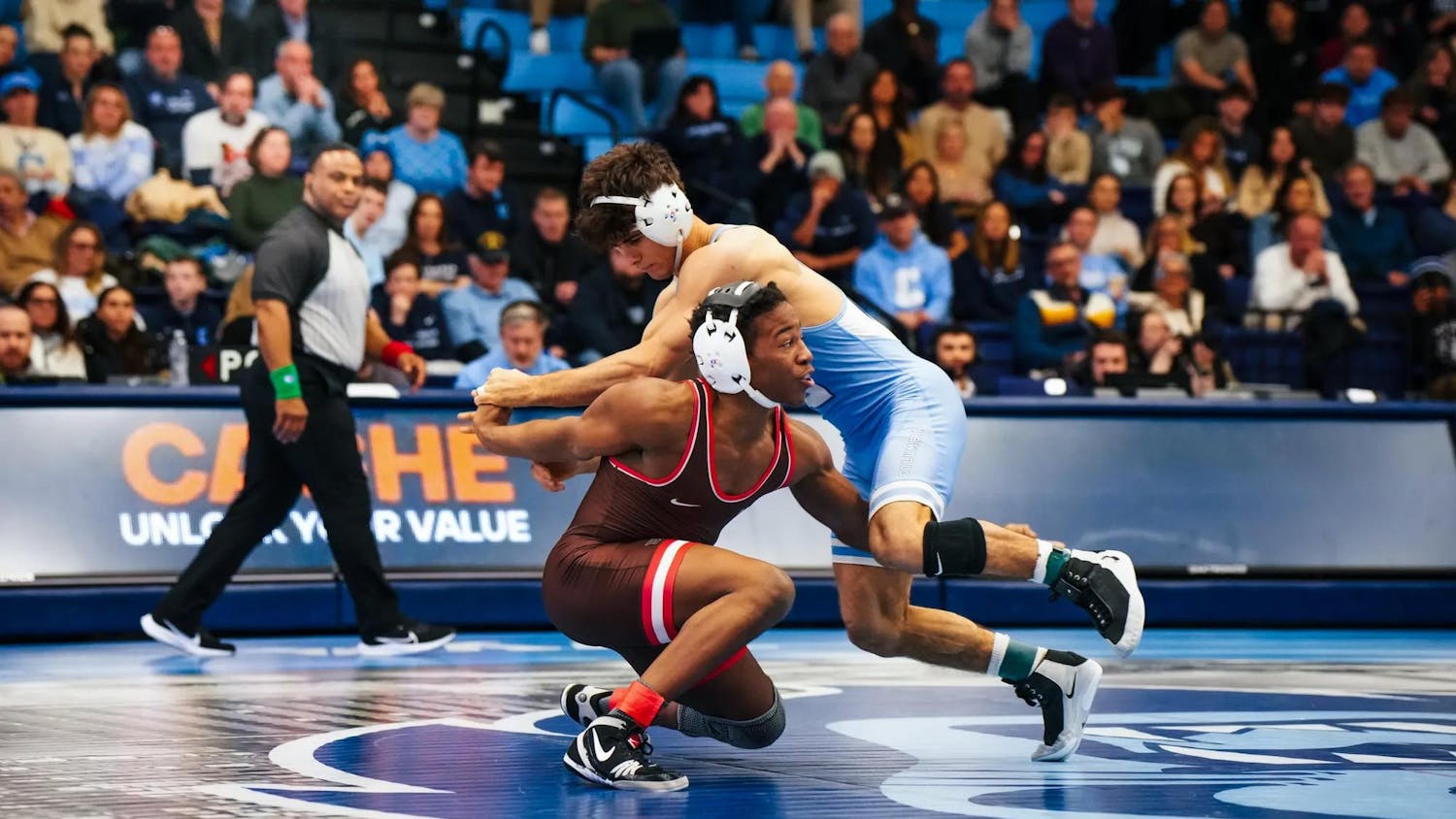When athletes from the women’s track, field and cross country teams found out that their counterparts on the men’s teams had been demoted to the club level May 28, their first reaction wasn’t relief that they had been spared. Instead, they were devastated alongside their teammates, absorbing the magnitude of the loss of half of their team. Athletes on both sides knew that their sport thrived as a result of a uniquely symbiotic relationship between the men’s and women’s teams: More than a team, they were a family, driven by each other’s successes.
As athletes from the men’s teams rallied for reinstatement, the women stood beside them, amplifying their voices and testifying to the power of unity in their team. Their support did not go unnoticed by President Christina Paxson P’19. Along with feedback about men’s track, field and cross country “being a really special community, especially as it relates to diversity and inclusion,” Paxson said she was struck by the womens’ show of solidarity — factoring it into her ultimate reversal of the decision and reinstatement of the men’s teams to varsity status.
“The Brown women made a very strong case that having the men be there — they share coaches, they train together — that was an important part of their experience, and that it made their team more successful,” Paxson said in a June 10 interview with The Herald.
When cross country runner Emily Skahill ’21 and her teammates found out about the initial demotion, they jumped into action. She remembers her captains confidently asserting: “We’re gonna organize, and we’re gonna fight this.”
Between training together and living in neighboring off-campus houses as upperclassmen, the men’s and women’s cross country teams share a close bond, inside and outside of practice, Skahill said. After meeting over Zoom with coaches and teammates immediately following the announcement to “absorb the shock together,” the women began brainstorming how to help the men’s team in their campaigning efforts.
In their GroupMe chat, the athletes from the women’s team delegated tasks: While one teammate with graphic design experience worked on the visual campaign, another helped create videos and another made social media content.
“Whatever anyone on the men’s team was doing, the women were doing that as well. If not more than the men, they were doing just as much,” said Bretram Rogers ’21, captain of the men’s track and field team. In the 12 days between the initial decision and its reversal, he and his fellow captains met with the women’s captains “almost every day” to organize and plan.
“Because we were still a team, we had some leverage that (the men’s teams) might not have had,” Skahill said, allowing them to relieve their teammates of some of the burden of organizing while they processed the emotions of their demotion.
Ijeoma Uche ’21, captain of women’s track and field, “went into fight mode” upon hearing that her teammates were demoted. And along with their campaigning efforts, she and the other women’s athletes made sure to provide emotional support to their male teammates, offering them an outlet for their frustrations to “get mad, or scream or cry,” she said. “We told them that we wouldn’t give up.”
When Women’s Cross Country Captain Ally Hajda ’21 found out the news of their demotion through Paxson’s initial community-wide email, she felt shocked and hopeless. “They’re our brothers, they’re our team, they’re our family,” Hajda said of her teammates on the men’s team.
The loss of the men’s teams would have been accompanied by a loss in valuable coaching staff to accommodate the now smaller roster, Hajda said. This, in turn, would have adversely affected the performance of the women’s teams in coming seasons.
With the men’s team and their alumni network, Hajda and her teammates stepped in wherever they could to help curate a successful campaign, which quickly took off on social media, catching the attention of public figures like Malcom Gladwell and publications like the New York Times.
Hajda and the other women’s athletes had found out about the reinstatement even before Paxson sent an email to the community. As soon as the men’s team was told over a Zoom call with Paxson and Director of Athletics Jack Hayes that they were once again varsity athletes, they quickly texted their teammates on the women’s teams to share the good news.
Just as when she found out about the demotion, Hajda was shocked, but it was “shock in a different way … like you just won the lottery,” she said. As the men finished up their Zoom call, the women organized a Zoom of their own to celebrate the victory. “We were all just screaming,” she said. As the Women’s Cross Country team rejoiced virtually, they only lamented that they couldn’t be together in person to celebrate.
Knowing that their voices had been heard by the University, and that their efforts had paid off, was highly rewarding, Hajda said. “We were ready to keep on pushing — even the alumni were saying that this was gonna be a long battle, it might be one, two, three years before the men get reinstated — so I think the fact that our voices were heard so strongly and quickly was just amazing, for the girls to see that our efforts were answered,” she said.
After processing the news, her teammates on the men’s teams called Hajda to “wholeheartedly” thank her for joining them in their fight.
Uche added that after days of nonstop emails, phone calls and Zoom meetings, she and her teammates could finally breathe a much-needed sigh of relief. “It felt like once again our family was together,” she said.
Rogers expressed deep gratitude for the crucial role the women’s teams played in their reinstatement. “Without them, we couldn’t have done it,” he said. “It means everything to me to know that they had our backs at our lowest.”
“I really can’t express how grateful I am to them,” he said.
Skahill, Uche, Hajda and Rogers agreed the teams feel even more united than before.
“This has already brought me a lot closer with every single one of the guys,” Hajda said.
This unity, Rogers said, is felt not only between the men’s and women’s teams, but between athletes from various events who may not have interacted much otherwise. Even incoming freshmen have forged bonds with outgoing seniors, he added, and alums have created mentorship programs for the current athletes. “We were always cousins, but now we’re all like brothers and sisters now,” Rogers said.
The fight doesn’t end with the reinstatement, Skahill said, and “that fire and that passion” backing their campaign will translate into their competition in the coming season. “We are even more determined now than we were before to show Brown that they made the right decision to reinstate the men’s team,” she said, “and that we are truly better together.”
The outcome, Hajda said, is “a victory that we all will celebrate for the rest of the year.”

ADVERTISEMENT




